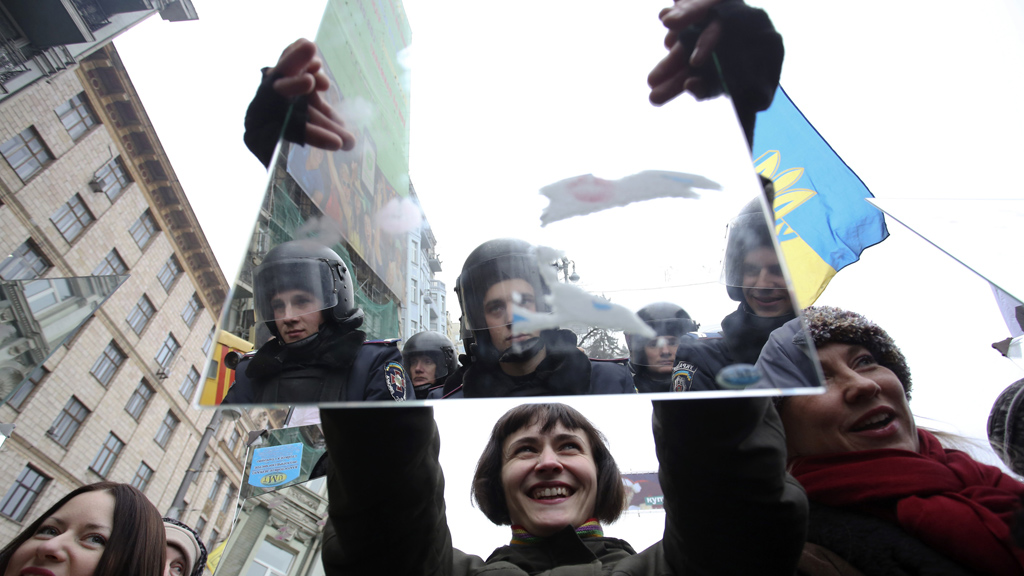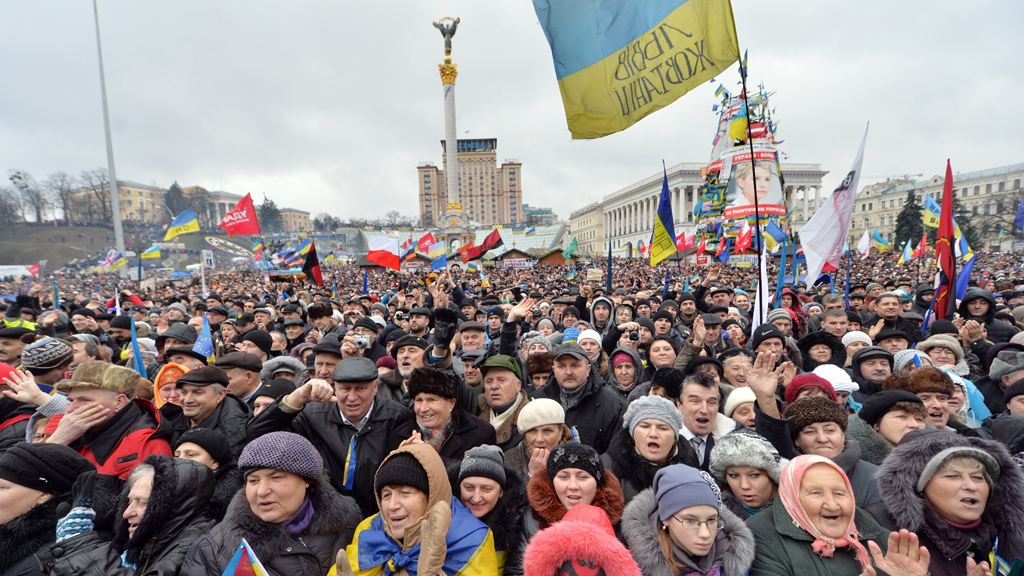Ukraine: mirrors in Kiev but what next for protesters?
Opposition leaders in Ukraine say they are bracing themselves for repressions after a court publishes a ban on protests in central Kiev.

Ukrainians have been taking to the streets since November despite the bitter cold, protesting against what they see as their government’s overly cosy relationship with Russia.
The pro-EU protesters began demonstrating last year, and after a break during the Ukrainian orthodox Christmas, 50,000 opponents of Ukraine’s President Viktor Yanukovich rallied on Independence Square in Kiev on Sunday.
The demonstration came a day after baton-wielding riot police tried to disperse protesters outside a Kiev courthouse, sparking clashes in which at least ten people were injured, including former Ukrainian Interior Minister Yuri Lutsenko.
Mr Lutsenko is a minister in the government of jailed opposition leader Yulia Tymoshenko – a symbol of Ukraine’s Orange Revolution.
The ban, decided on 6 January but only issued now, runs from 8 January to 8 March and defines a mass protest as “an event using loudspeakers…. posters, putting up of tents, stages or curtains.”
The court did not explain the delay in publishing the ban but opposition activists saw it as the sign of a tougher line to come.
“We believe that it is a fact of preparation for… repressions against peaceful activists across the country,” said a statement from the opposition party UDAR led by former heavyweight boxing champion Vitaly Klitschko.
In early December, a violent crackdown by riot police of a student demonstration in Independence Square accelerated protests across the former Soviet republic.
However, since the huge Sunday rally, numbers appear to have dwindled. On Tuesday, some just 200 integration activists picketed the roadway outside of Mr Yanukovich’s residence in Mezhyhirya.
Yanukovich’s regime will not stop at anything. Vitaly Klitschko
In another protest, a group of about 200 people marched down a central Kiev street, pushing through police lines and scuffling with officers along the route.
Activists also urged politicians to boycott the Inter TV channel over what they say is biased coverage of protests in Kiev.
EU sanctions
But some emblematic images from the protests, such as the one above, have started to take off on social media – and demonstrators have vowed to fight on.
The viral images show demonstrators holding up mirrors in front of riot police in Kiev. Protesters say they are holding up the mirrors to force police to look themselves in the eye and reflect upon their actions.
The protests began following Mr Yanukovich’s decision to abandon a free trade agreement with Europe in favour of closer cooperation with Russia, but opposition leaders have widened their aims since then.

On Sunday Mr Klitschko called on European powers to sanction members of President Yanukovich’s government.
In a videotaped statement provided by his political party Udar, Mr Klitschko called for sanctions against Mr Yanukovich and members of his government.
“In Germany, I had meetings with European parliamentarians and politicians. Before what happened last night, some of these politicians in their conversations were expressing hope that the Ukrainian authorities would never ever use force [against protesters] because they promised not to do it.
“Today their mood is different. They understand that Yanukovich’s regime will not stop at anything. That’s why the issue of personal sanctions is as real as it’s ever been before.
“I am calling again on European politicians to consider this question as soon as possible. Only personal sanctions against those who are the backbone of the Yanukovich regime can stop this regime.”
Read more from Channel 4 News on the Ukraine protests here
European Commission President Jose Manuel Barroso said Tuesday members of the EU were united in their support for the sovereign right of Ukrainians to decide their own future.
“We should not give up on our commitment to those countries in our neighbourhood that want to link up with the freedoms and the way of life they see in the European Union,” he said in an address from Brussels.
Mr Barroso said the enduring commitment of Ukrainian demonstrators is a testament to the strength of the democratic values embraced by EU members.
“We have seen Europe at its most popular: a beacon of hope and values, a guarantee of human rights and liberties,” he said.
On Wednesday the Committee on Foreign Relations of the United States Senate held hearings in the US on the political situation in Ukraine.
Former US National security adviser Zbigniew Brzezinski, who will be testifying at the committee, sent a message to protesters in Kiev (see video below).
He told the Kyiv Post: “What you are doing is historically vital. You now have to translate that into an effective political tool.”